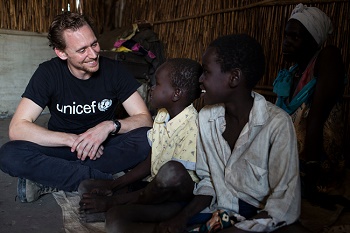UNICEF Ambassador Tom Hiddleston returns to South Sudan as the brutal conflict enters its fourth year
UNICEF Ambassador Tom Hiddleston travelled to South Sudan last week to see how the brutal civil war continues to destroy the lives of vast numbers of children across the country.

UNICEF Ambassador Tom Hiddleston meets brothers Buom, 12 (right) and Jal, 9, who have been separated from their mother since the conflict began in 2013, at the Protection of Civilians camp in Bentiu, South Sudan, on 25 November 2016.
Mid-December will mark three years of conflict in South Sudan. On his second visit since February 2015, Hiddleston saw how conditions remain as fragile and severe as ever.
The worsening security situation, economic collapse, reduced harvest and a cholera outbreak have contributed to a severe nutrition crisis for children, especially in areas facing renewed fighting and displacement. More than 170,000 children have been treated for malnutrition in 2016 alone.
“Everyone I’ve met has experienced traumatic events that no one – least of all a child – should ever have to go through,” said UNICEF Ambassador Tom Hiddleston.
“It’s heart-breaking to see that after three years, innocent children are still bearing the brunt of the conflict. The physical reality is that when fighting breaks out, everybody runs in different directions. Children become separated from their families – from their mothers, from their aunts, from their brothers, from whoever is looking after them – and are immediately vulnerable to psychological and physical abuse, hunger, and forced recruitment as child soldiers.”
Hiddleston travelled to the north of South Sudan to a displacement camp in Bentiu where he met children who have escaped violence, recruitment and abuse. In Bentiu, he met two brothers who had been separated from their mother when fighting broke out across the country in December 2013. The boys have had to live with a neighbour in their shelter for the last three years. UNICEF’s family tracing and reunification programme has managed to locate the boys’ mother, and they will be reunited with her soon.
"I’ve seen things in South Sudan that will stay with me forever. It’s the youngest country in the world, a country which should have so much to look forward to, but the conditions those two boys have to live in – a place still torn apart by civil war – are unimaginable. Knowing that they will be reunited with their mother soon is at least a sign of hope in the immense struggle of the people of South Sudan,” said Hiddleston.
Hiddleston saw first-hand how UNICEF is reaching families living in the country’s largest displacement camp, home to 108,000 people, with lifesaving food and water, child protection services and healthcare. Many of the children he met have been living in the camp since the conflict began. Across South Sudan, UNICEF estimates there are currently more than 860,000 children who are psychologically distressed.
Since civil war broke out in December 2013, more than 14,000 unaccompanied, separated and missing children have been identified across the country. Of those, 4,484 children have been successfully reunited with their families through UNICEF’s family tracing and reunification programme.
A few weeks ago, 145 children were released by armed groups in South Sudan. This is the second largest release of children since 2015, when 1,775 children were released in the Greater Pibor Administrative Area. It is estimated that 17,000 children have been recruited as child soldiers since 2013.
Close to 3 million South Sudanese have now fled their homes and are either internally displaced or have sought refuge in neighbouring countries since December 2013. This includes an estimated 1 million children reported to have been internally displaced as well as half a million child refugees.
UNICEF is working to protect the children of South Sudan, delivering life-saving food, clean water and vaccines, as well as providing education and psychological support. However, humanitarian aid alone cannot keep pace with the tremendous needs of some of the most disadvantaged children in the world.
Source: United Nations Children's Fund
- 244 reads
Human Rights
Ringing FOWPAL’s Peace Bell for the World:Nobel Peace Prize Laureates’ Visions and Actions

Protecting the World’s Cultural Diversity for a Sustainable Future

The Peace Bell Resonates at the 27th Eurasian Economic Summit

Declaration of World Day of the Power of Hope Endorsed by People in 158 Nations

Puppet Show I International Friendship Day 2020

